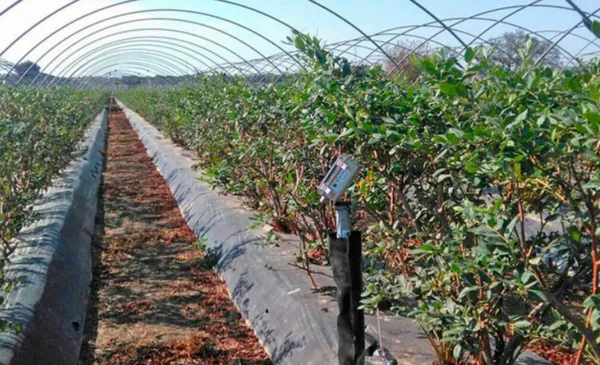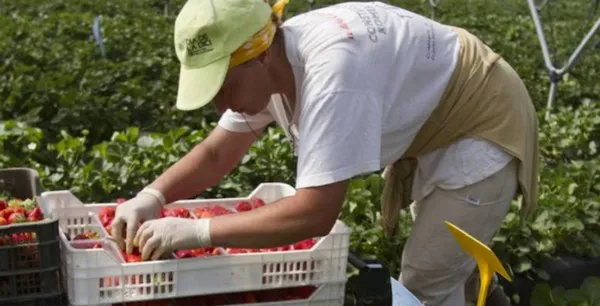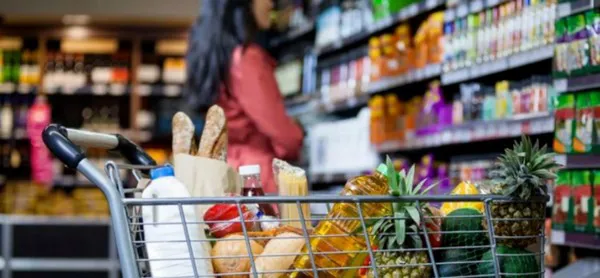What started as a campaign supported by 150,000 people in Germany encouraging supermarkets to stop buying Spanish strawberries could become a more serious problem. Following this boycott attempt to avoid contributing to the drying up of the wetland Doñana, a group of German MPs is visiting Spain this week. Growers are "offended" by what they see as an "unacceptable intrusion."
The largest wetland in Southern Europa, Doñana National Park (Southwest Andalucía), is under the greatest water stress ever known, which is harming, above all, the biodiversity of its migrating birds. To improve the economic development of the area, for many years, the Spanish governments have tolerated the growth of berry crops (mainly in the Andalusian province of Huelva) and urban development both on the periphery of the park without sufficient control.

Doñana would be perfectly protected if the existing laws which were issued at the time for its protection had been observed by national and regional authorities along the years. More recently, it has been observed that the wetland situation has been aggravated by the effects of climate change as well.
Doñana, becoming part of the political discussion
The aquifer that supplies water to Doñana has been deeply affected over the last fifty years due to the abstraction, often illegally, of water from the underground on the periphery of the wetland for berry cultivation and tourist resort supply.
According to experts, what is happening in Doñana is a symptom of the lack of a long-term strategy for water management in Spain. For a country with large recurrent periods of drought and high temperatures for a significant part of the year, a broad national agreement to address the consequences of climate change is more necessary than ever.

A recent proposal submitted to the regional parliament for the validation of some illegally irrigated lands sparked a political battle just before the regional and local elections held last May. Immediately afterwards the national government decided to bring forward the general elections to the end of July. Three elections in two months are not creating a very favorable atmosphere for reaching a political agreement on water use.
One last fact only polarizes the debate. A delegation of German MPs decided to travel to Spain to examine the Doñana environment and, more specifically, the "illegal extraction of water", following the attempted boycott by the German platform Campact, which urges citizens to ask supermarkets not to sell strawberries from Spain.
A new element enters in scene
Strawberry growers do not believe the "irresponsible" dissemination on their social networks by the national government of the German platform campaign encouraging boycotts. They regret that PM Pedro Sánchez and his Minister for Ecological Transition, Teresa Ribera, are willing to do anything "for electoral interests". They demand not to encourage an "insidious and harmful" campaign that could put at risk a sector that in Huelva (one of the eight provinces of the Andalusian region, where the majority of red fruits are grown) generates 100,000 direct jobs and around 60,000 indirect jobs.
What is more, strawberry growers point out that, contrary to what is being made out, "there are no crops in the park, neither of berries nor of any other type," but that "nearest farms are 35 kilometers from the wetland, and the vast majority of companies in the berry sector grow crops more than 100 kilometers away". They claim that this is the same "manipulation" that farmers suffered in the May elections in the face of the proposal presented by the right-wing in the Andalusian parliament.
The interbranch organization Interfresa has also reacted by pointing out that berries from Huelva make up 98% of production in Spain and 30% in the EU, contributing 11.35% of the province's GDP. The strawberry sector in Huelva says to have a strong commitment to the environment and, for this reason, promotes the sustainability of the area, with measures such as the adaptation of greenhouses to more efficient irrigation techniques and the reduction of plastics.
Getting more serious
What started as a campaign supported by 150,000 people in Germany could become a serious problem for growers and exporters of strawberries and other berries in Spain. A visit by a delegation of German MPs started yesterday, Monday, and will last until next Friday, to "monitor" the use of water in Andalucía. First, they planned to meet with the Secretaries of State for the Environment and Consumer Affairs, from the national government, and then travel to Andalusia.
The "supervision" trip of these German MPs is a step up in the strawberry crisis in Huelva, in which the ruling party in Andalucía points to the Socialist Sánchez as the "instigator". It is a mission of a country going to a Spanish region to monitor water use, not an EU mission or any other supranational body with a supervisory role.
Yesterday Sánchez's government was forced to come forward to explain its role in the German MPs' mission. They said that they had not been involved in the preparation of the visit, although they had agreed to meet with the MPs.
Competition between growers?
Politicians and farmers in Huelva complain that every year there is a new smear campaign against strawberries in the area. They add that these campaigns correspond to the time when Germans harvest their strawberries. This year, the campaign has had a stronger echo because of the loudspeaker provided by the PM and his minister Ribera. "They don't care about water resources, it's a question of competition," Huelva growers say.
The German platform's call for a boycott is not only aimed at supermarkets but also appeals to consumers, asking them to opt for "regional, seasonal strawberries," a message similar to that of some local producers, who compare "ecological, local, open-air German production" with the environmental impact of imports from Spain. They also argue that, although it may be more expensive, German strawberries have "more flavor and vitamins" because they are harvested closer to home.

Beyond Doñana
The case of Doñana is an example, perhaps the most painful because of its exceptionality and importance, of the consequences of the lack of a national agreement on the water in Spain. The worsening of drought periods and its consequences due to the effects of climate change are a stark reminder. Spain needs a nationwide political agreement in order to design a water strategy that climate change is making more and more essential. Without a broad consensus not excluding any option -water transfers, desalination, reuse, and technological innovations- the viability of Spain's agri-food sector, as well as its natural heritage, will continue to be compromised even in the near future.
Breaking news
The delegation of German MPs that was to supervise the situation of strawberry irrigated farms will finally not visit Andalusia due to the growing unease about their initiative. Yesterday they kept their agenda in two national ministries even though they knew they would not be traveling to Doñana. The Bundestag's communiqué on the cancellation of the visit states that the reason for the cancellation is "the great political importance that the topics of the trip have acquired in the last few days in view of the upcoming general elections in Spain."
